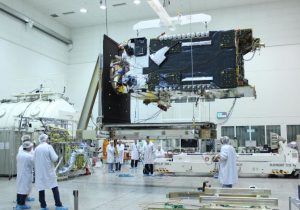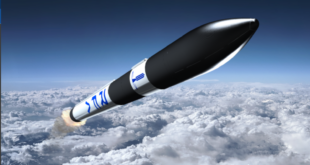
The Israeli government will shortly come to a decision on the manufacturer for its own satellite – and this has become a hot topic in industry and political circles. Perhaps somewhat controversially, Israeli satellite operator Spacecom decided to purchase its next satellite, AMOS-8, from Space Systems Loral, an American satellite manufacturer, rather than the indigenous IAI, which had previously been the manufacturer of choice for satellite missions and has provided satellites for the Ministry of Defence and other businesses both in Israel and internationally.
Israeli defence minister Avidgor Lieberman, attended an IAI event earlier this week to view the Heron TP Unmanned Aerial System (UAS) that has netted a large contract with Germany. When asked by The Marker about his perspective on selecting IAI as the manufacturer for the satellite, he said: “The question isn’t whether I support buying the satellite from IAI or not. The decision to purchase is a professional one. We need to see in detail the satellite being offered and its price and compare offers. … There’s no room for protectionism.”
IAI has said that it will build and operate its own satellite and ask for government backing. It now appears that a decision will rest on economic and national security interests. By selecting one, dedicated satellite for use by the government, security threats increase as the asset could become a target for terrorist activity. Utilising Spacecom’s satellites would alleviate this threat to a large extent due to the fact that capacity would be spread over several satellites, thus decreasing the risk. Economically, IAI is not making any profit out of its satellite business and, when Spacecom approached both IAI and Space Systems Loral for quotes for AMOS-8, SSL agreed to build the satellite for U.S.$112million and IAI U.S.$200million and to complete it in two and three years, respectively.
There is much debate over whether IAI continues with its satellite unit which employs only 50 people and hinders IAI’s progress in terms of profitability and efficiency. However, it is claimed that the argument is political as the IAI workers committee holds a position of power in the Likud party primaries.
 SpaceWatch.Global An independent perspective on space
SpaceWatch.Global An independent perspective on space




